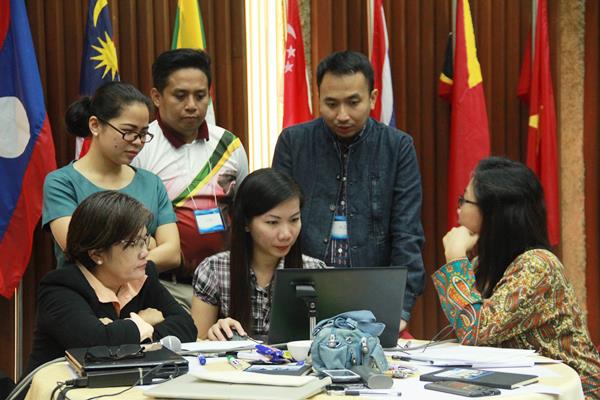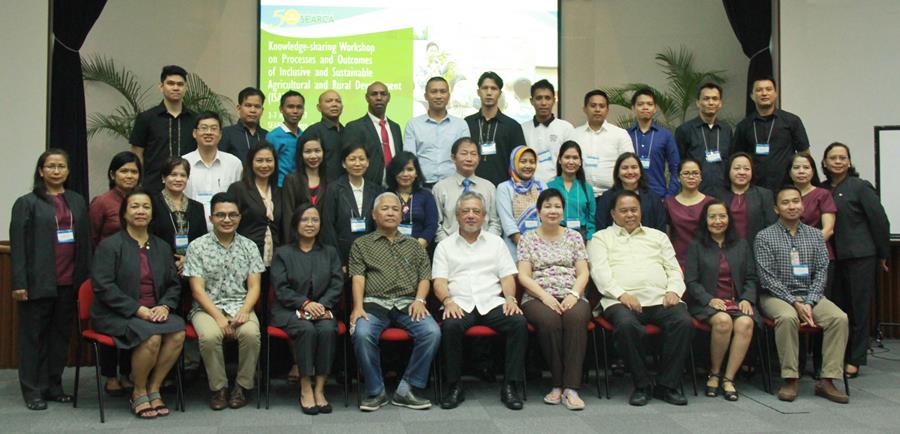These are key takeaways as 23 pilot action researchers and other enthusiasts gathered for the Knowledge-sharing Workshop on Processes and Outcomes of Inclusive and Sustainable Agricultural and Rural Development (ISARD) at SEARCA'S headquarters in Los Baños, Laguna, Philippines, on 3-7 April 2017. This training workshop, with focus on knowledge management and effective communication for ISARD, is the fourth of a series of learning events by which SEARCA has supported its project on piloting and upscaling effective models of ISARD.
"Our almost 50 years of experience in agricultural and rural development (ARD) provides fertile ground for harvesting lessons learned, concepts, methodologies, technologies, and best practices that characterize effective agricultural systems or ISARD models," said Dr. Gil Saguiguit, SEARCA Director. "For this workshop, we aim to equip (the participants) with know-how and skills in knowledge management and communication, which are integral to continuing success and sustainability of ISARD pilot projects."
Coming from different parts of the Philippines and neighboring ASEAN countries Cambodia, Thailand, Indonesia, Timor-Leste, and Vietnam, the participants attended the training workshop with much vigor, interest, and enthusiasm as each module is seen with great importance to their work in ARD. Dr. Jose Medina, ISARD Coordinator and a participant, said that he believes KM will play a big role in addressing the many challenges facing the two ISARD pilot projects in Inopacan, Leyte and Victoria, Oriental Mindoro, which are organizing farmers and empowering them to self-manage their efforts to improve their agricultural systems.
 "One of the knowledge (needed) is how to market the products. So in addressing this problem, we are trying now to develop the collectivity of people. For example, as farmers, they have to learn how to market their agricultural products not just as individual farmers but as a farmer group," Dr. Medina explained. "We can more or less integrate knowledge generated with the support of SEARCA and partner universities into a pool of knowledge together with local knowledge." Resource persons from the University of the Philippines Los Baños College of Development Communication (UPLB CDC) presented to participants the necessary theoretical foundation, principles, and examplars on KM and Communication and selected tools.
"One of the knowledge (needed) is how to market the products. So in addressing this problem, we are trying now to develop the collectivity of people. For example, as farmers, they have to learn how to market their agricultural products not just as individual farmers but as a farmer group," Dr. Medina explained. "We can more or less integrate knowledge generated with the support of SEARCA and partner universities into a pool of knowledge together with local knowledge." Resource persons from the University of the Philippines Los Baños College of Development Communication (UPLB CDC) presented to participants the necessary theoretical foundation, principles, and examplars on KM and Communication and selected tools.
As knowledge needs to be shared to be useful and further evolve, the training workshop sought to enhance the participants' communications skills, including crash courses on storytelling, photography, policy brief writing, social and online media writing, case and feature story writing, and KM and communication planning. The trainees enjoyed the photography workshop, where they were tasked to go out and take photos of their chosen subjects that were presented and evaluated afterwards.
Dr. Ma. Theresa H. Velasco, Dean, with Assistant Professor Winifredo B. Dagli, leads the team of workshop facilitators and resource persons from UPLB CDC.
The representatives from Victoria, Or. Mindoro and Inopacan, Leyte are SEARCA's partners in implementing the Project on Piloting and Up-scaling Effective Models of ISARD, which the Center has implemented since January 2015 in collaboration with the Visayas State University, Mindoro State College of Agriculture and Technology, their respective local governments, and local organizations. The initiative articulates the centerpiece of SEARCA's tenth five-year plan on designing and pilot-testing intervention models toward ISARD, harvesting lessons, processing them, and up-scaling or disseminating the ISARD model to other communities and countries in Southeast Asia. ISARD's pilots are coordinated by SEARCA's Research and Development Department, while the knowledge-sharing workshop is an offering of its Knowledge Management Department Training Unit. (Dennis Rodel G. Santiago)
